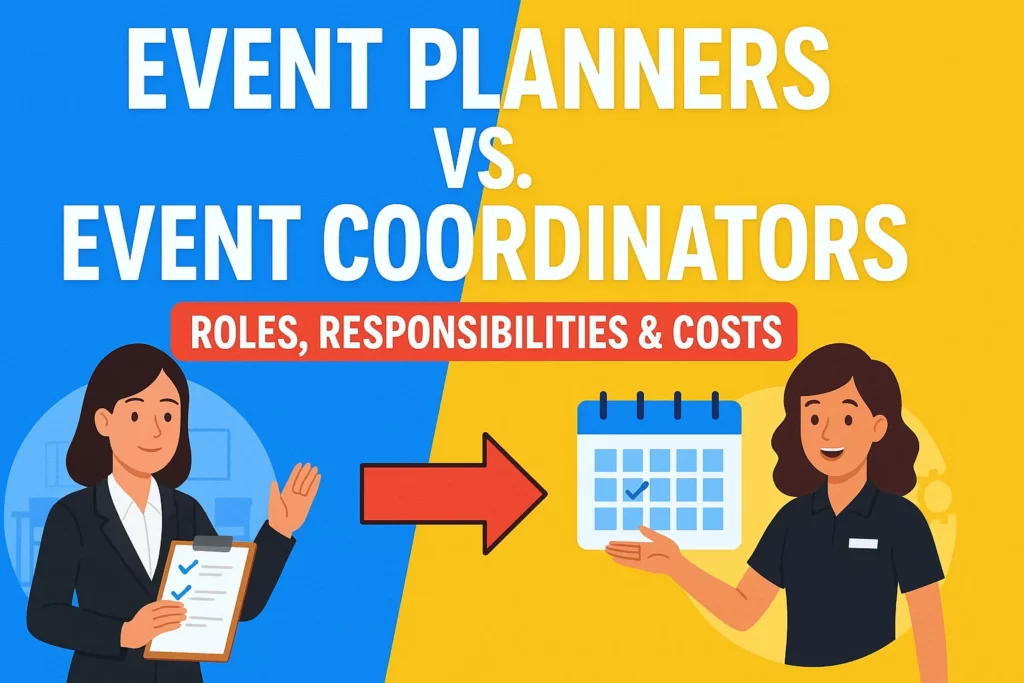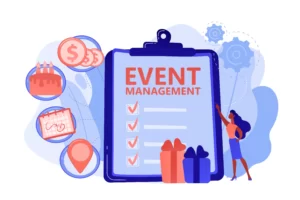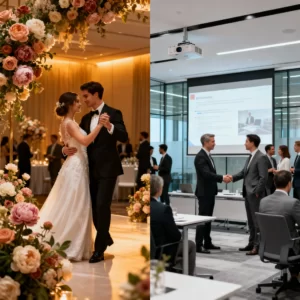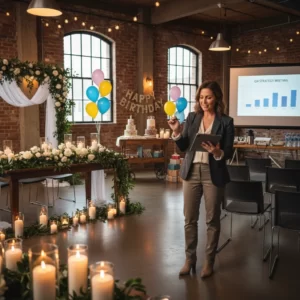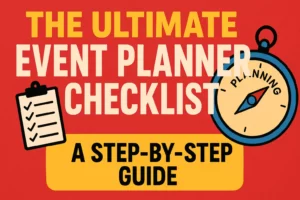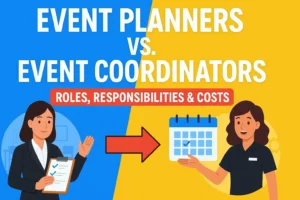Event Planners vs. Event Coordinators: Roles, Responsibilities & Costs
TL;DR:
- Event Planners = vision creators. They handle the big picture: theme, budget, venue, vendors, and strategy from start to finish (usually hired 6–12+ months ahead). Fees often run 10–20% of the budget or $75–$250/hr.
- Event Coordinators = execution experts. They manage the day-of logistics: timelines, vendor arrivals, setup, troubleshooting (typically hired 1–3 months before). Costs are lower, often $800–$2,000 flat or $30–$75/hr.
- Hire a planner for full-service, large, or complex events. Hire a coordinator when you mainly need someone to run the event smoothly on the day. Many big events benefit from having both.
Event professionals ensure events run smoothly. Event planners and coordinators both play critical roles, but their scopes differ significantly. An event planner is a strategist who works with the client to design the event’s vision, theme, and budget from the start. By contrast, an event coordinator (often called a day-of or on-site coordinator) focuses on logistics and execution, taking plans already made and ensuring everything happens on schedule. In practice, planners “orchestrate events from start to finish” – choosing venues, developing themes, managing budgets and schedules – while coordinators “execute the event planner’s vision” by handling set‑up, vendor management, and troubleshooting on the day.
When discussing event invitations, many clients often ask about RSVP meaning and the proper etiquette around guest responses. This is typically handled in the planning phase, ensuring clarity for attendees well before the event day.
Defining the Roles

- Event Planner: A planner is engaged early to shape the event concept. Planners meet clients to determine objectives, guest count, budgets and overall theme. They research and book venues, negotiate contracts, select vendors (catering, entertainment, décor, etc.), create detailed timelines, and track all arrangements. They often provide creative direction (colors, design, branding) and carry accountability for the big-picture vision. For example, a wedding planner will guide a couple through their entire wedding journey – from A-to-Z – including choosing the venue, selecting vendors, and mapping out the schedule. In corporate settings, planners organize conferences and meetings by defining goals, securing locations and speakers, and managing budgets. In short, planners “create the vision and theme” and handle the prep work.
Along with vendor contracts, planners also advise on stationery needs. Many clients want to know how to address an envelope correctly for formal occasions like weddings or galas, which falls under the finer details of planning.
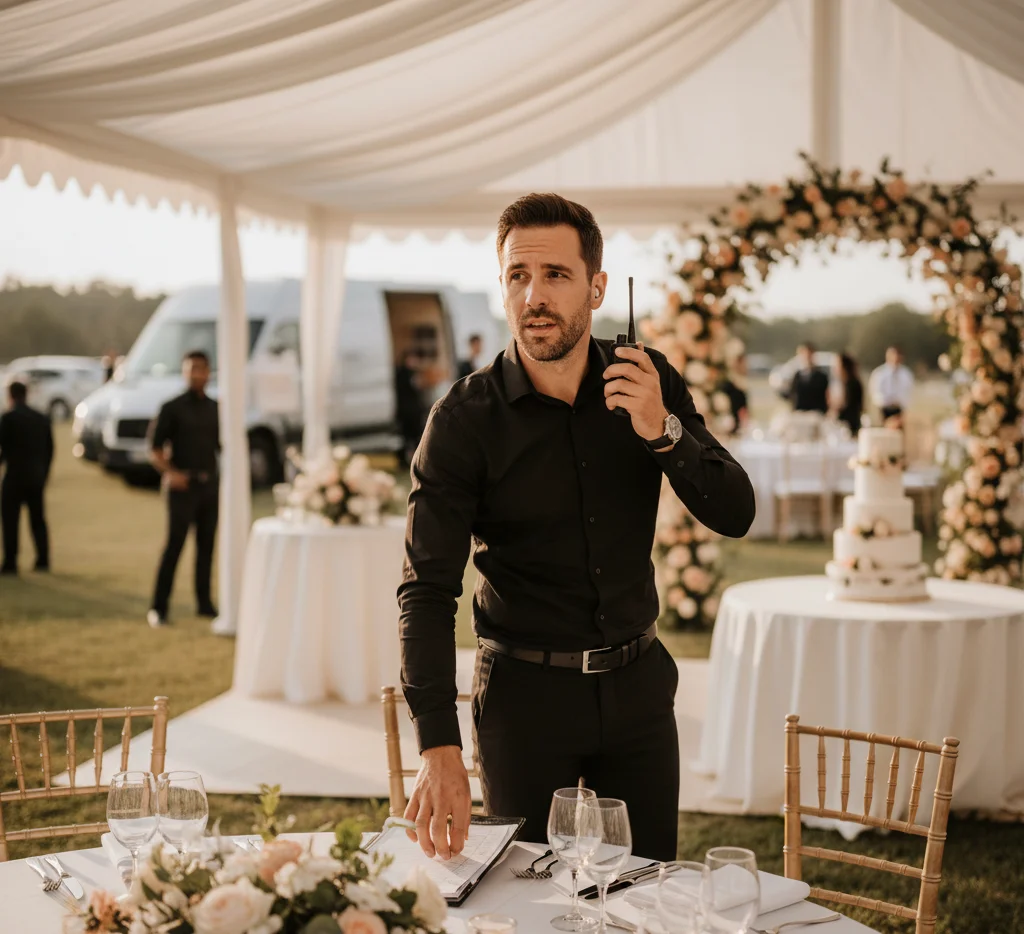
- Event Coordinator: A coordinator’s role is more specialized and tactical. Once the planning is largely done, a coordinator takes charge of bringing that plan to life. Their main duties include creating and managing the day-of schedule, coordinating vendors’ arrivals and services, setting up and breaking down the venue, and solving any problems in real time. For example, on the wedding day the coordinator manages the rehearsal, oversees setup, directs staff and volunteers, and keeps the event on schedule. In corporate or social events, they ensure the agenda runs smoothly, attendees are assisted, and any last-minute issues are handled without disrupting the event. In essence, coordinators are the “execution experts” on-site: they know every detail of the plan and make sure the event flows as intended. Importantly, an event coordinator is usually hired by the client, not the venue; they advocate for the host’s interests (unlike a venue’s in-house coordinator, who answers to the venue staff).
When planning weddings, couples also ask about music budgets, such as how much do DJs cost for weddings?. This falls under the planner’s vendor selection, while coordinators ensure the DJ is set up and performing on time.
Key Differences in Responsibilities, Scope & Timeline
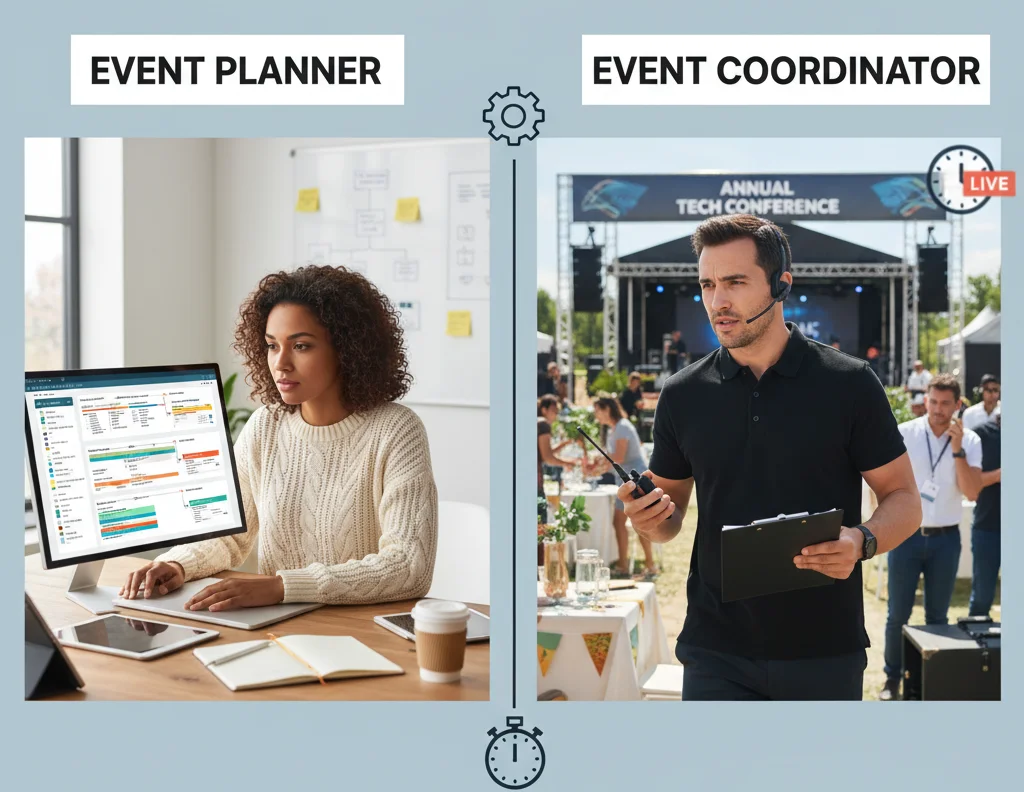
The table below summarizes the main distinctions:
| Aspect | Event Planner (Designer) | Event Coordinator (Doer) |
| Scope & Timing | Engaged early (often months ahead). Designs concept, budget and logistics. Handles pre-event planning through execution. | Usually hired later (weeks–months before). Focuses on finalizing details and managing the event day. Often called a “day-of” or “month-of” coordinator. |
| Primary Duties | Conception & Planning: Set event objectives; create theme; select and contract vendors; manage budget; develop timeline and floor plans. | Logistics & Execution: Assemble and execute detailed run-of-show; coordinate vendor deliveries; manage setup/breakdown; keep event on schedule; troubleshoot issues in real time. |
| Client Contact | Works closely with client throughout planning to shape vision and make key decisions. | Acts as main point-of-contact during final planning and on event day; coordinates between vendors, venue staff, and client. |
| Creativity | Involved in creative/design aspects (themes, décor concept). Sometimes offers design/styling services. | Focuses on practical details; may offer minor creative input but mainly ensures creative plans are implemented correctly. |
| Budget Role | Defines and manages overall budget, negotiates vendor contracts, advises on cost savings. | Works within the existing budget. Could manage onsite expenses (tips, last-minute needs) but does not typically set the budget. |
| Staffing | May build a team (assistants, designers) for large events; sometimes works solo for smaller events. | Often one coordinator on-site, though multiple coordinators may assist for very large events. |
| Examples of Events | Weddings, conferences, large galas, festivals, corporate events (expos, conventions), fundraisers – especially when A–Z planning is needed. | Day-of or month-of wedding coordination, on-site event execution for any occasion, and when clients (individual or company) need support handling the event itself. |
| Pricing Model | Typically flat fees or percentage of total budget (often 10–20%). Hourly ($75–$250+) or package rates also common. | Often flat fee for the event (package rate), or hourly. May charge by the day (e.g. $800–$2,000 for a full event day) or by hour (e.g. $30–$75/hr). |
If you’re deciding whether you need an event planner, a coordinator, or a mix of both, it can help to look at real professionals side by side. Seeing typical roles, pricing, and availability together often makes the choice clearer — especially for weddings, corporate events, or large celebrations.
- Event planners offering full-service or partial planning
- Event coordinators focused on day-of or month-of execution
- Clear pricing ranges and service scopes by event type
Luxury venues sometimes add another layer to this decision. For example, hosting at Royal Albert Palace may require both a planner to coordinate the large-scale details and a coordinator to manage execution on the day.
When to Hire Each
- Event Planners: Because planners are involved in all early decisions, it’s best to hire a planner as soon as you’ve set your date and major parameters. Industry guidance (e.g. Brides) recommends booking planning professionals immediately after the venue and date are secured — even if the planner won’t start active work until months later. For large weddings or conferences, planning ideally begins 6–12+ months in advance. A corporate planner might join a year before an annual conference to align goals, budget and logistics.
Event planners also help couples organize bachelor and bachelorette parties as part of the overall wedding journey, especially when these celebrations tie into the theme or weekend timeline.
- Event Coordinators: Coordinators usually join later in the process. A day-of or month-of coordinator is often hired in the last 1–3 months before an event. Brides.com advises securing your coordinator early (as soon as you know your date) even if they only step in close to the event. In practice, couples might hire a coordinator 4–6 weeks out to finalize details, whereas corporate or non-profit hosts might engage coordinators as the event nears. The coordinator then spends roughly 8–10 hours on the event day plus additional prep (e.g. final walk-throughs).
Photography is also a crucial part of planning. Some clients look for specialized services such as Avery Sports Photo when covering athletic events, corporate gatherings, or family reunions.
Examples by Event Type:
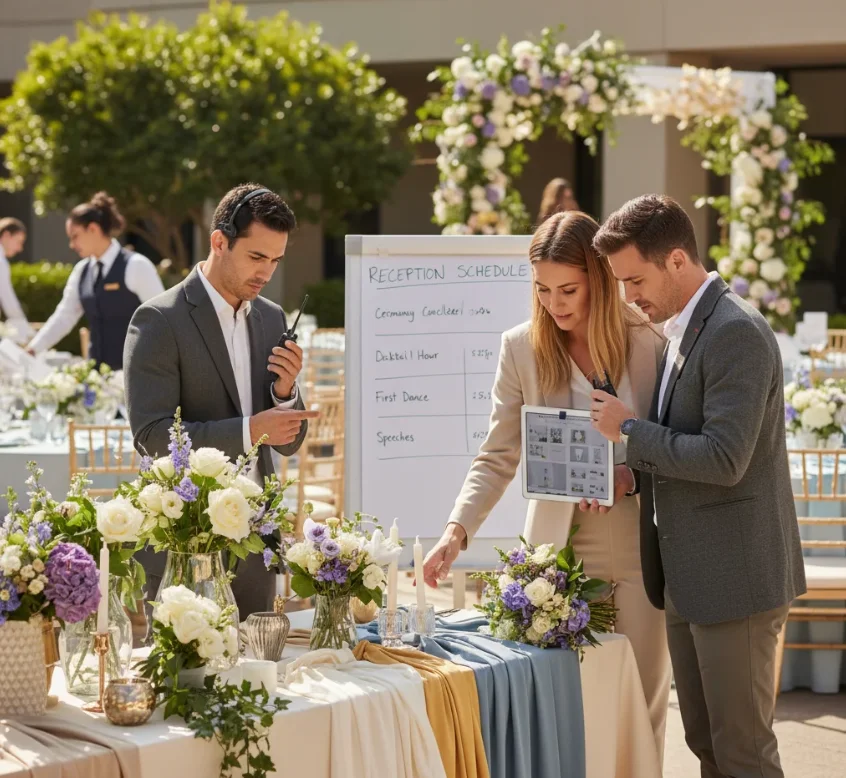
- Weddings: A bride and groom often enlist a full-service wedding planner up to a year before the wedding to design the entire celebration, negotiate with vendors, and manage the budget. A day‑of (or month‑of) coordinator is then added near the end of planning (typically 1–2 months prior) to compile the final timeline and oversee the ceremony and reception. For example, a planner ensures all design elements are chosen, while the coordinator makes sure the florist and DJ show up on time and execute the plan. Brides sometimes do basic planning themselves and hire only a coordinator to “take care of last-minute details and make sure [nothing is] missed”.
Planning a wedding reception is a major part of the planner’s responsibilities, as it requires coordinating catering, seating arrangements, entertainment, and timeline flow.
- Corporate Events: Corporations may employ in-house planners or hire agency planners to manage conferences, trade shows, or annual meetings. A corporate event planner would begin several months in advance to handle venue RFPs, technology, speakers and registrations. On the event day, one or more coordinators (sometimes called event managers) will oversee registration, AV operations, catering, and run-of-show. In large conferences, teams of coordinators may work under a lead planner to handle complex logistics. Budgetwise, corporate events tend to have large budgets ($5,000–$100,000+), so planners often charge a flat fee or percentage (10–20%) of the overall spend.
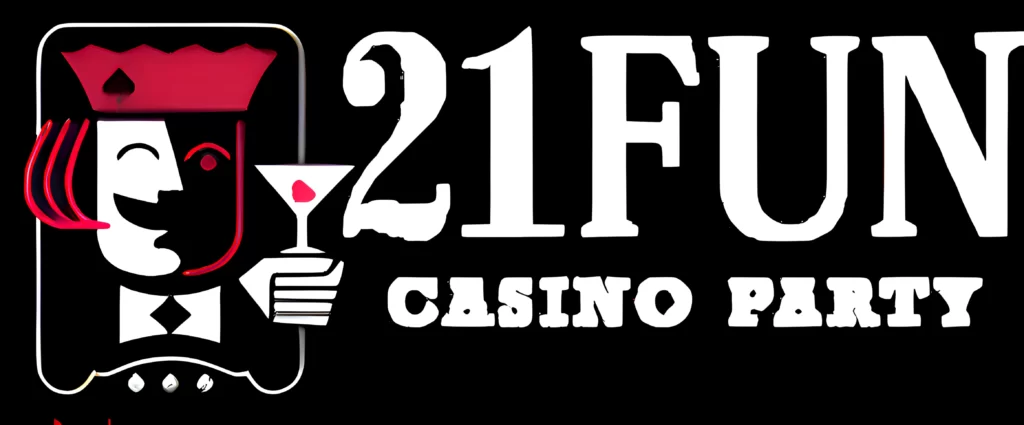
21Fun – Casino Party Rentals in California
- Birthdays, Anniversaries, Reunions: Social events vary in scale. For an intimate birthday or small anniversary, hosts may not need a planner; a coordinator or party service might manage entertainment, catering, and set-up. For mid-size celebrations or milestone birthdays, hiring a planner 2–6 months ahead can help with invitations, theme, and vendors. Some couples also plan a 10 year anniversary gift as part of the celebration.
- Fundraisers & Galas: These charity events often have tight budgets and ambitious goals. Event planners for fundraisers may negotiate sponsorships and create elaborate programs. Some planners work for a percentage of ticket sales or donations, rather than a flat fee, aligning their incentive with event success. A coordinator would then be on hand the day of the gala to direct guests, manage auctions or performances, and ensure fundraising goals are met during the event.
U.S. Pricing Guidance
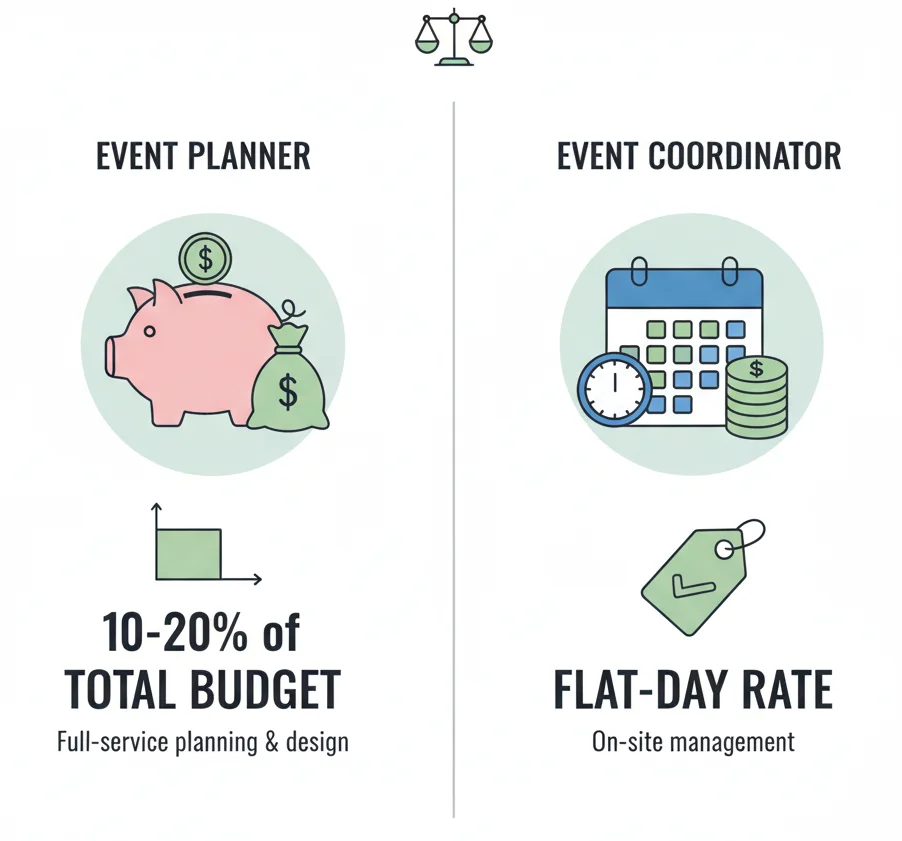
Planners: In the U.S., event planners use various fee models. Many full-service planners charge a flat project fee (based on scope) or a percentage (typically 10–20% of the total budget). Hourly rates are common too – often $75–$250 per hour for experienced planners. Newer or local planners may start around $25–$75/hr. For example, Brides.com reports that full-service wedding planners often charge roughly 15–20% of the wedding cost (so a $30,000 wedding could mean a $4,500–$6,000 planner fee). Many planners also offer tiered packages or day-of coordination services.
Coordinators: Since coordinators have a narrower role, their fees are typically lower. Many charge a flat fee for the event day. For example, a “day-of” wedding coordinator might cost $1,000–$2,000 for 8–12 hours of service. Some coordinators charge hourly (e.g. $30–$75/hr) plus materials. Because coordinators handle fewer months of work, total costs are often significantly less than full-planning. For corporate or larger events, an event coordinator might be a salaried staff member ($40K–$60K/yr in the U.S. on average) or a contractor charging daily rates.
Pricing Models Summary: As in event planning generally, both planners and coordinators may quote hourly, flat-fee, or percentage rates. • Hourly: e.g. $25–$100+ for planning work or day-of coordination, depending on experience.
Flat Fee: One total project price (often packaged), common for packaged planning or coordination packages. • Percentage: A share of the event budget (planners often 10–20%; coordinators rarely charge percentage except for very large corporate budgets). Each model has pros and cons: hourly can grow unpredictable, percentage aligns with scope, and flat fee offers clarity.
Comparison Table
| Feature | Event Planner | Event Coordinator |
| When Hired | As soon as the event date is set; ideally months in advance (6–12+). | Later in timeline (typically 1–3 months before) or just for event day. |
| Main Role | Designs and organizes the event: sets vision, budget, theme; books venue and vendors; oversees overall planning. | Executes the plan: creates detailed day-of schedule; coordinates vendors on-site; manages setup, schedule, and logistics. |
| Scope of Work | Broad (creative + logistic). Includes budgeting, vendor negotiations, creative decisions, marketing (if needed). | Narrower (tactical). Primarily on-the-ground operations on event day and immediate prep. |
| Client Interaction | Frequent, consults on all decisions leading up to event. | Main contact on day-of for questions or issues; may meet briefly before event to finalize details. |
| Typical Events | Large or complex events where full planning is needed (big weddings, conferences, festivals, multi‑day events). | Any event needing day-of support. Often used for weddings and parties where the host or planner already arranged details. |
| Cost Structure | Higher fees overall: hourly $75–$250+, 10–20% of budget, or high flat fees. | Lower fees: hourly ($30–$75) or flat-day rates ($800–$2,000). Overall cost is typically a fraction of a planner’s fee. |
Summary

In sum, event planners are the architects of an event – hired early to conceive, plan and manage an event from vision through execution. Event coordinators are the builders – brought in later to manage the detailed execution and troubleshoot on the big day. Planners handle budgets, vendors, and creative design; coordinators handle timelines, set‑up, and smooth operation. Clients should hire planners months ahead for full-service planning, and coordinators (often called day‑of or month‑of coordinators) in the final phase to ensure flawless delivery. Costs reflect these differences: full-service planners command higher fees (often 10–20% of budget or premium hourly rates), while coordinators charge more modest flat or hourly fees for their focused services. Understanding these roles helps event hosts decide whether they need planning, coordination, or both. (It’s always wise to have someone dedicated to executing your plan on event day, even if that’s simply a qualified coordinator overseeing the details.)
Sources:
Frequently Asked Questions
What is the difference between an event planner and an event coordinator?▾
An event planner designs and organizes the overall event, managing the budget, vendor selection, and creative direction. An event coordinator focuses on executing the event plan on the day, handling logistics, timelines, and vendor coordination to ensure smooth event delivery.
When should I hire an event planner versus a coordinator?▾
Hire an event planner as early as 6–12 months before your wedding, corporate event, or large celebration to design the vision and handle preparations. Coordinators are usually hired 1–3 months prior to the event to manage day-of execution, timelines, and vendor logistics.
Can a coordinator handle multiple events at once?▾
Yes. Experienced coordinators can manage multiple events simultaneously, focusing on on-site logistics and day-of coordination, while event planners concentrate on long-term planning and creative direction for each event.
Do event planners and coordinators work together?▾
Yes. Event planners and coordinators often collaborate. Planners define the event vision, theme, and budget, while coordinators implement the plan, manage the venue, and ensure the event schedule is followed correctly.
Which events benefit most from hiring both a planner and a coordinator?▾
Large weddings, corporate conferences, festivals, and multi-day events benefit from both roles. The planner oversees budgeting, creative design, and vendor contracts, while the coordinator ensures smooth on-site execution and real-time problem solving.
How do planners and coordinators manage event budgets differently?▾
Planners often charge a flat fee or a percentage of the total budget (10–20%) because they handle comprehensive planning. Coordinators usually charge a lower flat or hourly rate since they focus on day-of operations and logistics.
Can coordinators provide creative input for events?▾
Coordinators primarily focus on logistics, but may offer minor creative suggestions to ensure the planner’s vision is executed properly. Major creative decisions remain the responsibility of the event planner.
Is it possible to hire only a coordinator for a small event?▾
Yes. Small events like birthdays, intimate weddings, or micro celebrations can rely solely on a coordinator to manage day-of setup, vendor coordination, and troubleshooting without a full-service planner.
How do planners and coordinators communicate with vendors?▾
Planners negotiate contracts, select vendors, and set expectations in advance. Coordinators act as the on-site point of contact, ensuring vendors arrive on time, follow the schedule, and execute the plan correctly.
Related Post
Contact Us
Please provide your contact information with event details. You will be contacted soon.

